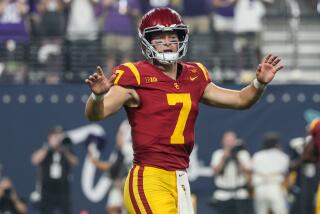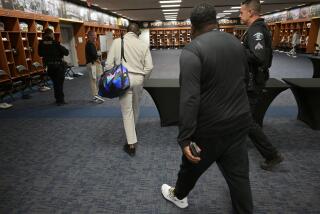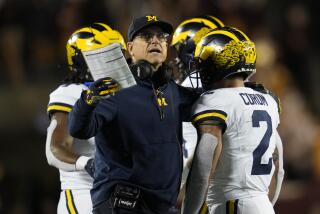Depositions Recount Mills Case
- Share via
LEXINGTON, Ky. — The father of basketball recruit Chris Mills, named in a key charge against the University of Kentucky by the National Collegiate Athletic Assn., initially said he wanted to return a package from a Wildcat assistant, which allegedly contained $1,000 in cash, court documents indicate.
The NCAA has charged that assistant basketball coach Dwane Casey sent Claud Mills $1,000 in cash as an inducement in the recruiting of Chris Mills of Fairfax High, now a Kentucky freshman.
The allegation led to a wide-ranging investigation of the men’s basketball program at Kentucky, which now faces 17 other charges of NCAA violations.
Depositions of employees of the Los Angeles handling center of Emery Worldwide air freight filed in U.S. District Court here show that Claud Mills was told by employees of Emery that a package sent to him on March 31 contained cash.
The depositions said that after the initial phone call from Emery, Mills called company officials at least twice, asking about the package and when it was to arrive at his Los Angeles home.
Steven Chris Nelson, a supervisor at Emery in Los Angeles, where the package allegedly broke open revealing the cash, said he called the addressee on the package to tell him that there was cash in the package and that Emery did not handle cash. He said he later learned that person was Claud Mills.
“Did he indicate any surprise at learning that there was money in the package or indicate he was expecting the money,” James Park Jr., an independent Kentucky investigator, asked during the interrogatory.
“No, because he said, ‘Who is sending me money?’ ” Nelson said.
According to Nelson, Mills said that he wanted to send the package back, but Nelson told him that sinceEmery did not handle cash he would have to find another means of returning the package, the documents said.
“He said he wanted to send the money back to whoever had shipped it to him and did the driver have envelopes on his truck,” Nelson said. “And I said, ‘Yes, but I just told you: We don’t want to handle money. You send it back to him, use some other means other than Emery, because that’s not in our terms and conditions to handle currency, precious stones and antique coins.’ ”
Emery dispatcher Richard Flanders said Emery driver David Jones had difficulty delivering the package because it had the wrong address.
According to the depositions, Claud Mills later called Flanders, to ask where his delivery was.
Flanders said, during the first call from Mills, he radioed Jones to determine when the package would be delivered. Jones, who had been told the package contained the money, responded: “Yes, I have his money,” Flanders said.
He said Mills, on the other end of the line, heard the exchange and became “irate.”
“He wanted to know specifically how we knew what he was receiving and how we had no right to look into his package and he wanted it delivered right away,” said Flanders, adding that Mills threatened to notify police of the incident.
“It seems to me that I remember him saying, ‘How do you know I’m getting money?’ ” Flanders said.
According to the depositions, Mills also called Nelson at Emery later that day and asked when the package would be delivered.
“I think he wanted to make sure that the package was on its way to him, I believe,” Nelson said. “And then he again mentioned something, I believe, about wanting to send it back and I told him, I said, ‘Well I told you before, we don’t want to have anything to do with it. Use some other means to send it back.’ ”
The package was eventually delivered to the Mills home, and the signature on the receipt reads “C. Mills.” Previous reports have said that Chris Mills signed for the package, but he and his father have denied receiving any money.
In other developments, the University of Kentucky and the Louisville Courier-Journal filed suit in Fayette Circuit Court to obtain a court order for the release of the other NCAA allegations.
In the joint petition for a declaration of rights, the newspaper and the university asked the court to “declare whether the NCAA complaint must be made available for inspection and copying by the (newspaper) pursuant to any exemption to the (Kentucky) Open Records Law.”
The university has released the allegations in summary form only, with no names disclosed. Park has recommended the university not release the names in the allegations because it could violate privacy laws.
More to Read
Go beyond the scoreboard
Get the latest on L.A.'s teams in the daily Sports Report newsletter.
You may occasionally receive promotional content from the Los Angeles Times.










